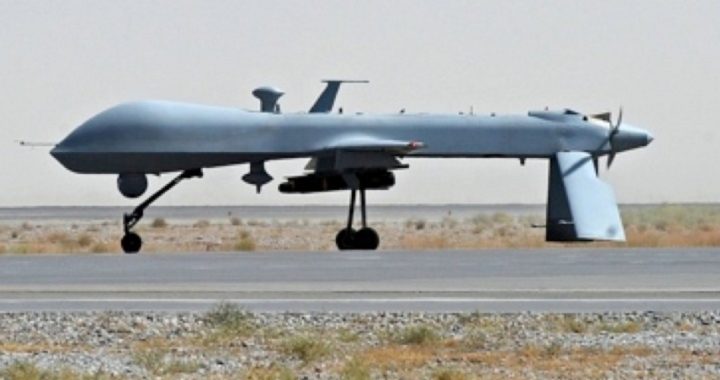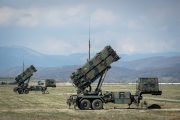
In November, Yemenis were likely thankful that the buzz of U.S. Predator and Reaper drones died down. Thanksgiving is over, however, and the fireworks for New Year’s Eve were more likely Hellfire missiles than bottle rockets.
On January 3, a drone reportedly operated remotely by agents of the CIA fired missiles at a vehicle traveling in the town of Rada’a in the Yemen province of Baydah.
Yemeni officials quoted by AFP reported that Mukbel Abbad and two underlings were killed in the strike.
Those same officials identified Abbad as a “senior al-Qaeda in the Arab Peninsula (AQAP) leader.
Long War Journal writes that AQAP has “increased its presence in Baydah province over the last year, and the U.S. has pursued the terror group with drone strikes.”
On May 28, 2012, for example, the United States used drones in a failed attempt to track and assassinate Kaid al Dhahab and his brother Nabil, alleged leaders of the regional branch of the larger al-Qaeda network, while the pair traveled in Rada’a.
It is noteworthy that these two suspected “militants” are brothers-in-law of Anwar al-Awlaki, an American born cleric who was the first American known to be assassinated by President Obama.
Awlaki was killed by a drone attack on the command of President Obama on September 30, 2011.
Awlaki was placed on the president’s infamous kill list after he was suspected of influencing the Ft. Hood shooter, Major Nidal Hassan, as well as the so-called Underwear Bomber, Umar Abdulmutallab. No official charges were ever filed against the American-born cleric. The government never attempted to apprehend him and try him for his alleged atrocities. He was placed on a proscription list and murdered.
The hit reportedly went down like this: On September 30, 2011, while Anwar al-Awlaki had stopped to eat breakfast, two unmanned Predator drones fired Hellfire missiles killing him.
Two weeks later, Awlaki’s 16-year-old son Abdulrahman was killed in similar manner.
Abdulrahman al-Awlaki was killed in October 2011, and to date the Obama administration has never informed the country of any wrongdoing by this teenager, other than being related to a man (his father) who posted on the Internet anti-American videos that allegedly influenced others to commit crimes. A government-sanctioned assassination of such an individual is repugnant to all those who cherish life, liberty, and the due process that protects them.
Not only was the target of the nighttime drone attack a civilian, but so were the boys sitting with him when two U.S. missiles lit up the area and killed them all. Being merely near a person related to someone accused of being associated with a group allegedly affiliated with an alleged al-Qaeda network is apparently sufficient provocation for becoming “collateral damage” in the U.S. “War on Terror.”
Citizens and foreigners alike must now recognize that the government of the United States has assumed all power over life and death and has passed law after law legalizing that usurpation. In America today, every man, woman, and child (including unborn children) is required by force of law to appeal to the ultimate arbiter of the right to life for their continuing existence. Should they at any time fail to adequately demonstrate the required level of obedience, then their life, liberty, and property may be confiscated without recourse and seemingly without remorse on the part of those carrying out the sentence.
Yemenis are weary of the war and the reckless and indiscriminate killing of their countrymen by the government of the United States.
The threat to U.S. national security reportedly increases proportionately with the increase in the number of Hellfire missiles fired indiscriminately at suspects and bystanders in Yemen. This deadly relationship and the Obama administration’s zeal for adding and subtracting names from their kill list is increasing the danger of blowback.
Blowback is defined as violent counter-attacks carried out as revenge for drone strikes that have killed thousands, many of whom were doing nothing more threatening than going to the market or attending a funeral.
After a drone attack killed 13 Yemenis by “mistake” in September, relatives of those killed in the strike spoke with the clarity and carelessness that comes from the mixture of mourning with rage.
“You want us to stay quiet while our wives and brothers are being killed for no reason. This attack is the real terrorism,” said Mansoor al-Maweri, whom CNN reports as being “near the scene of the strike.”
Then there was this from “an activist” who lives near the site of the September massacre: “I would not be surprised if a hundred tribesmen joined the lines of al-Qaeda as a result of the latest drone mistake,” said Nasr Abdullah. “This part of Yemen takes revenge very seriously.”
The irrefutable fact is the prosecution of the drone war in Pakistan, Afghanistan, Yemen, and North Africa is creating more enemies than it is destroying. Al-Qaeda couldn’t cook up a more effective recruitment program than the U.S. drone war that is allegedly aimed at eliminating the “terrorist” organization.
Although U.S. officials typically do not comment on this or any other drone strike in Yemen or elsewhere, the president of Yemen isn’t quite so close-mouthed about the arrangement between the two “allies.”
In a statement made to the Washington Post in an interview published September 29, President Abed Rabbo Mansour Hadi said he “personally approves every U.S. drone strike in his country.”
Hadi’s praise for the Predators continued during a speech delivered at the Woodrow Wilson International Center for Scholars. “They [drones] pinpoint the target and have zero margin of error, if you know what target you’re aiming at,” Hadi said, according to the New York Times.
As the Washington Post rightly posits, it is likely this personal interest in promoting President Obama’s drone war that has influenced U.S. officials to consider Hadi “one of the United States’ staunchest counterterrorism allies.”
The complicity of the Yemeni regime is likely key to the crescendo of drone strikes in that nation. Since Christmas Eve 2012, the United States has conducted five drone strikes in Yemen.
Long War Journal writer Bill Roggio reports that “The US is known to have carried out 42 airstrikes against AQAP in Yemen in 2012.” Last year, Roggio writes, a “total of 42 strikes was a marked increase from 2011, when just 10 strikes were recorded in Yemen.
Since the government began its covert drone war in Yemen in 2002, 383 people have been killed by the Predators and Reapers that patrol the skies. Not a single one of these people has ever been either charged with a crime or permitted to answer the allegations of intention to threaten the safety of the United States.
Due process doesn’t concern President Obama or those pulling the triggers on the joysticks guiding the missiles toward their human targets. Those “militants” murdered by the United States government are not afforded even the most perfunctory due process protections, but are summarily executed upon order of the president.
This murderous mien might explain the recent offer by al-Qaeda in Yemen of a bounty in gold for the killing of Gerald Feierstein, U.S. ambassador to Yemen.
With the president’s signing of the 2013 NDAA, it would seem that due process — both for citizen and foreigner alike — is slouching toward extinction.
Photo of U.S. Predator drone: AP Images
Joe A. Wolverton, II, J.D. is a correspondent for The New American and travels frequently nationwide speaking on topics of nullification, the NDAA, and the surveillance state. He can be reached at [email protected].



